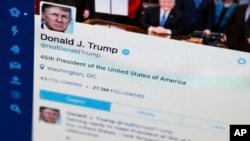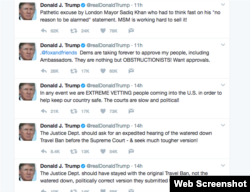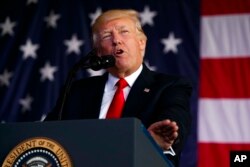Memo from legal experts to President Donald Trump on resurrecting his stalled travel ban: Put down Twitter.
Trump's 140-character musings Monday may have undercut his own efforts to persuade the Supreme Court to reinstate his revised travel ban, which Trump called a "watered-down, politically correct'' version of what he'd originally sought. Just as Trump's Justice Department is arguing the ban doesn't target Muslims, legal experts said the president seems to be suggesting the opposite.
Those who oppose the travel ban said Trump's Tweetstorm, ironically, helps their case. Neal Katyal, the former acting solicitor general representing Hawaii in its lawsuit against the ban, said it was as if Trump was his co-counsel.
"We don't need the help but will take it!'' Katyal wrote in his own Twitter post.
The courts in January halted Trump's initial order, which banned travel from seven majority-Muslim countries and indefinitely halted entry to Syrian refugees. Trump begrudgingly scaled back the order by removing Iraq from the list and making the Syria refugee ban only temporary, but that order was blocked by the courts, too.
At the heart of the legal wrangling is whether Trump's proposed ban violates the Constitution by discriminating on the basis of religion. As a candidate, Trump called for a "Muslim ban,'' comments that came back to haunt him as president when the courts determined that even his scaled-down order was "rooted in religious animus and intended to bar Muslims from this country.''
Not so, the Justice Department has argued, insisting the temporary ban is based on credible national security concerns unrelated to religion, and his campaign statements should be ignored. But Stephen Vladeck, a University of Texas law professor, said Trump was making that argument much less tenable by calling the revised order "politically correct.''
"These tweets are basically winking at his supporters to say, obviously, I'm only doing this so that the courts will uphold it,'' Vladeck said. "It makes it harder to argue this is not a Muslim ban, and more importantly, it makes it harder to argue that the president's statements should be irrelevant.''
In a series of early-morning tweets, Trump bashed the Justice Department for its decision to ask the Supreme Court to review the second version of the ban — which he signed.
"The Justice Dept. should have stayed with the original Travel Ban, not the watered down, politically correct version they submitted to S.C.,'' Trump said. He urged the Justice Department, which he oversees, to seek a "much tougher version'' of the order.
Hoping to shore up the order's legal underpinnings, both the White House and Trump's Homeland Security chief have insisted it's not actually a "travel ban,'' criticizing reporters for mischaracterizing it. But Trump on Monday was having none of it.
"People, the lawyers and the courts can call it whatever they want, but I am calling it what we need and what it is, a TRAVEL BAN!'' Trump wrote.
The inconsistency put White House spokeswoman Sarah Sanders in a delicate spot Monday afternoon as questions streamed in about why Trump was contradicting his aides. His Twitter missive notwithstanding, Sanders insisted Trump "isn't concerned with what you call it,'' only with protecting Americans.
Sanders said the president had asked the Justice Department to pursue an expedited hearing at the Supreme Court, adding that Trump "wants to go as far and as strong as possible under the Constitution to protect the people of this country.'' Still, she said he'd signed the revised ban "for the purposes of expediency'' and wasn't considering a third version of the ban.
Trump argues the ban is crucial for safeguarding American security, and he has intensified his push for it in the wake of the weekend vehicle and knife attack in London that left seven people dead and dozens injured. The Islamic State group has claimed responsibility for the attack.
The second-guessing about Trump's Twitter strategy extended to the husband of one Trump's senior advisers. New York lawyer George T. Conway III, whose wife is White House aide Kellyanne Conway, wrote that online statements "may make some ppl feel better,'' but won't help win a Supreme Court majority.
"Sad,'' he said on Twitter, borrowing a phrase from Trump's own Twitter.
Conway had been considered for at least two high-ranking Justice Department jobs, including solicitor general, the government lawyer who represents the president at the Supreme Court.
Josh Blackman, a law professor at South Texas College of Law in Houston, called Trump "the worst client'' for the solicitor general.
"When you're a lawyer what you want is your client to stay silent,'' he said.
Trump has the authority to order the Justice Department to pursue a different strategy. It's unclear whether the president has conveyed his requests to the department in a forum other than Twitter. The Justice Department declined to comment.
Trump has used attacks around the world to justify his pursuit of the travel and immigration ban, one of his first acts since taking office. The original order, signed at the end of his first week in office, was hastily unveiled without significant input from top Trump national security advisers or relevant federal agencies.
After that order was struck down, the administration decided to write a second directive rather than appeal the initial ban to the Supreme Court. The narrower would temporarily halt entry to the U.S. from Iran, Libya, Somalia, Sudan, Syria and Yemen.
If anything, Supreme Court may be more likely to hear the case in light of the tweets, to determine once and for all how far the president's power goes, said Peter S. Margulies, a law professor at Roger Williams.
It's unclear when it will make that decision.






